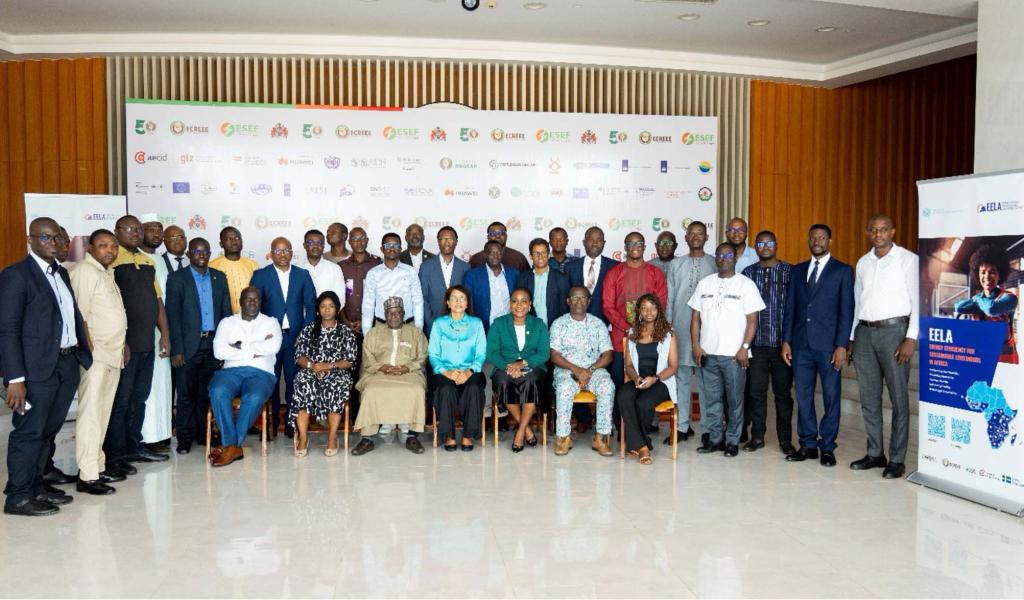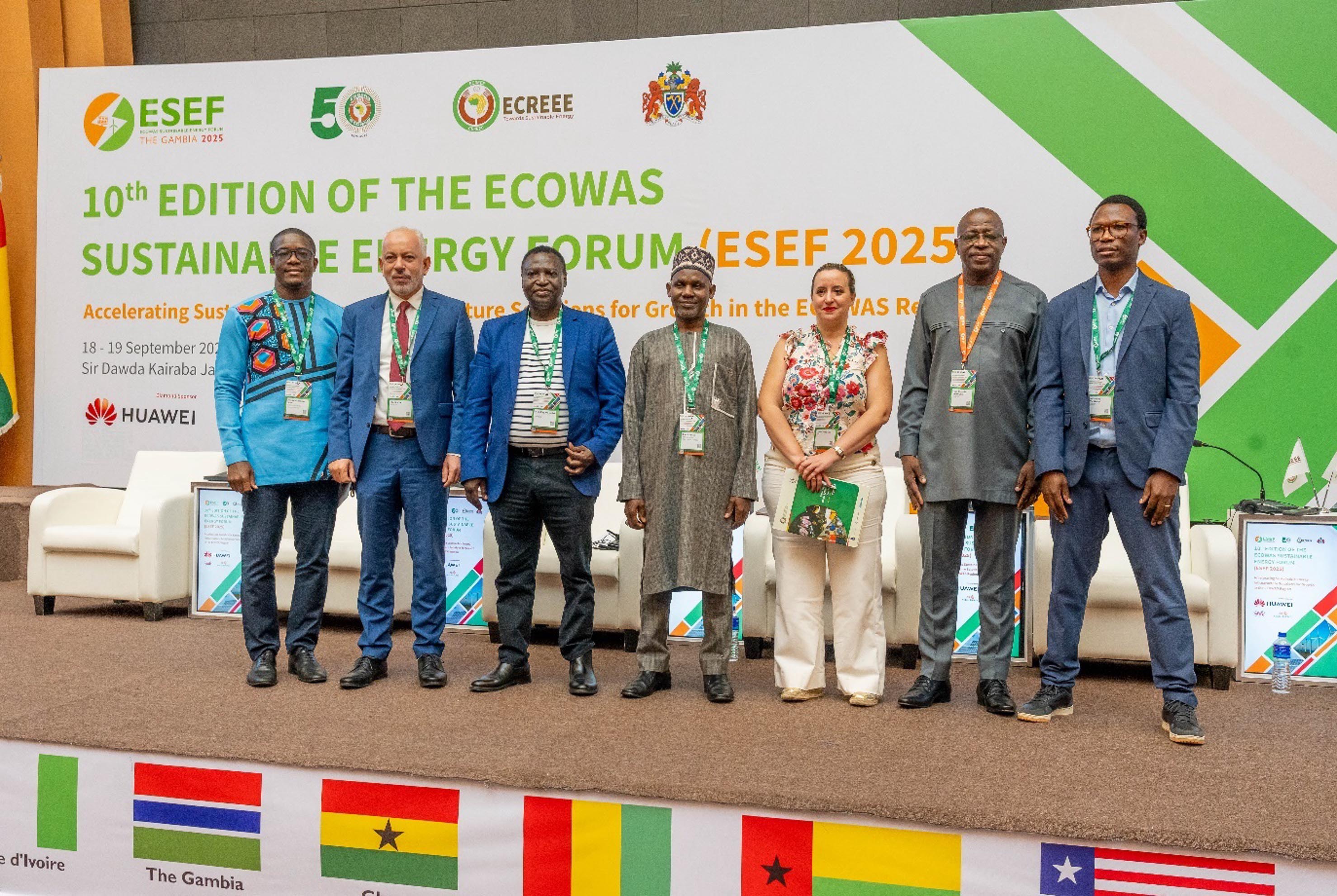News
EELA Panel Discussion at ESEF 2025: Advancing Energy Efficiency Dialogue in the ECOWAS Region

The first EELA event organized in the ECOWAS region, the panel discussion at the ECOWAS Sustainable Energy Forum (ESEF) 2025 in Banjul, marked an important step in regional dialogue on energy efficiency. Jointly organized by ECREEE and UNIDO, the session brought together energy ministries from Benin, Cabo Verde, Côte d’Ivoire, The Gambia, Ghana, Guinea, Liberia, Nigeria, Senegal, and Togo, along with national standards bodies, academia, the private sector, and development partners to discuss priorities and define targeted support for strengthening national energy efficiency systems under the EELA Program in the ECOWAS region.
Opening the session, Francis Sempore, Executive Director of ECREEE, and Ndivhuho Tshikovhi, Project Associate at UNIDO, expressed a shared perspective on the importance of expanding energy access while accelerating the transition toward energy-efficient products and systems. Sempore encouraged participating countries to outline their needs in areas such as product registration, e-waste management, and laboratory accreditation. Building on this, Tshikovhi highlighted how the new phase of the EELA Program seeks to reinforce compliance and enforcement mechanisms, strengthen laboratory readiness, and scale up efficient technologies, with the dual aim of supporting sub-Saharan countries, including those in ECOWAS, and deepening regional cooperation and South-South learning. In his opening remarks, Mr. Rafik Feki, UNIDO Regional Representative in Senegal, stressed that energy efficiency lies at the heart of resolving Africa’s energy paradox, meaning turning abundant renewable resources into real solutions for energy poverty, while serving as a catalyst for sustainable livelihoods, cost reduction, and resilience across ECOWAS, in line with UNIDO’s vision for Inclusive and Sustainable Industrial Development (ISID).
The EELA Program’s structure, theory of change, organizational approach, and progress to date were presented by Tshikovhi together with Readlay Makaliki, Lead Technical Expert at SACREEE. Their presentation was followed by two technical sessions. The first, on Energy Efficient Public Procurement (EEPP), examined the role of governments as the largest buyers of energy-using products and the opportunity this represents for transforming markets. In some EAC and SADC countries, public procurement accounts for up to 26% of GDP, yet product selection often overlooks life-cycle costs, leading to unnecessary energy consumption. EEPP frameworks, designed by UNIDO and SACREEE, provide guidance for integrating energy performance criteria into procurement processes, addressing barriers such as limited technical capacity, enforcement gaps, and perceptions of high upfront costs.
The second presentation addressed e-waste management guidelines for the EAC and SADC regions. Between 2019 and 2022, annual e-waste generation increased from 300,000 to 430,000 tons in the EAC and from 500,000 to 580,000 tons in the SADC region. Much of this waste contains hazardous substances such as refrigerants with high global warming potential, heavy metals, and toxic chemicals, posing risks to health and the environment when handled informally. At the same time, valuable fractions such as steel, copper, aluminium, and glass remain underutilized. The guidelines under consideration place Extended Producer Responsibility at the centre of policy options, linking energy efficiency efforts with environmental protection and resource recovery.
The session then turned to national case studies from South Africa, Ghana, and Côte d’Ivoire, each showcasing different but complementary approaches to strengthening compliance frameworks for energy efficiency. South Africa’s regulator demonstrated how compulsory specifications under the National Energy Act, backed by inspections, market surveillance, and the creation of a digital registration database, have enabled the systematic removal of inefficient products while improving transparency, despite ongoing challenges with industry submissions and the constant need for updates. Ghana emphasized a consumer-oriented model through QR code labels, expanded testing capacity, and cross-border cooperation with exporters in China, coupled with market surveillance at ports and retail outlets to curb the inflow of substandard appliances. Côte d’Ivoire, meanwhile, has advanced a national labelling programme aligned with WAEMU Directive 04/2020, already classifying nearly 740,000 products by late 2025, though it continues to face constraints linked to limited accredited laboratories and market surveillance capacity; in response, it has launched a broad communication campaign to promote consumer awareness and distributor compliance. Collectively, these experiences underline the importance of combining strong legal frameworks, accredited testing and registration systems, international collaboration, and consumer engagement to build effective compliance and enforcement systems in the ECOWAS region.

The insights from this workshop directly fed into the EELA high-level session at ESEF 2025 on 18 September, which brought together policymakers, regulators, and technical experts. The panel discussion, moderated by Tshikovhi, brought together Dr. Ing. Yosr Allouche, Director General of the International Institute of Refrigeration, Readlay Makaliki, Lead Technical Expert at SACREEE, Papa Secka, Director General of the Gambia Standards Bureau, and Hubert Zan, Assistant Manager for Energy Efficiency Regulation at the Ghana Energy Commission. Discussions focused on the status of energy efficiency policies across ECOWAS, highlighting both progress and remaining challenges.
Participants agreed on the need to update Minimum Energy Performance Standards (MEPS) to reflect technological advances and prevent the influx of outdated appliances into local markets. At the same time, they noted that weak enforcement mechanisms, outdated testing protocols, and limited institutional capacity often undermine MEPS implementation. Speakers stressed the importance of accredited testing laboratories, continuous training for customs officials, procurement officers, and technicians, and closer coordination among ministries responsible for energy, environment, and trade. This, they argued, would help avoid fragmented approaches and align standards across ECOWAS, EAC, and SADC regions, allowing countries to pool resources and send a clearer signal to manufacturers serving multiple African markets. Participants discussed the potential for South-South exchanges to accelerate the adoption of proven solutions across regions, while fiscal incentives and gradual MEPS introduction were considered essential to support early adoption of energy-efficient technologies.
The session concluded with appreciation for the contributions of all speakers and participants. The insights shared will inform the implementation of the EELA Program in the ECOWAS region, building on existing experiences and ensuring that support is tailored to the different levels of readiness among Member States. Priority areas identified include harmonizing and updating MEPS, strengthening monitoring and enforcement systems, expanding testing and certification capacity, and promoting knowledge exchange across regions.